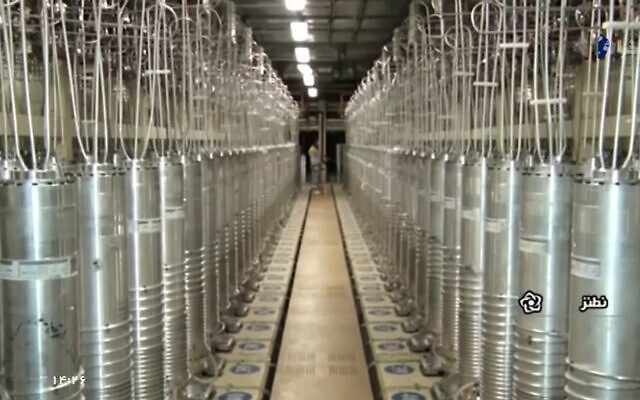Iran expanding uranium enrichment at Natanz site, says UN nuclear watchdog
Limited number of centrifuges set up to enrich beyond 20%, but product is not being kept, IAEA says in report seen by Reuters

Iran has taken another step to increase its enrichment activities in purifying uranium beyond 20 percent, Reuters reported Monday, citing a report by the International Atomic Agency.
The move at Iran’s Natanz plant is likely aimed at building knowledge of the refinement process, the report said, as the product from changes to centrifuges is not being kept.
Though Iran already enriches uranium to 60% at Natanz, research to improve enrichment methods is opposed by Western powers, as it is irreversible and builds Iran’s ability to produce weapons-grade uranium.
“On 25 October 2021, the Agency verified that Iran began feeding (uranium hexafluoride gas) enriched up to 20% U-235 into a single IR-6 centrifuge in R&D line 2 at PFEP,” the IAEA said in its report.
“The resulting product and tails streams were being re-combined,” the IAEA report noted, meaning that the enriched uranium was not being stored.
In response to the developments, the IAEA report said it will “increase the frequency and intensity of its safeguards activities” at the Pilot Fuel Enrichment Plant, an aboveground facility located at the Natanz site.
A statement from the IAEA outlining the report said that, last week, Iran had notified that it planned to make changes involving uranium enriched up to 20% in the setup of clusters of small to medium-sized enrichment centrifuges at Natanz. However, so far, those additional machines have not been fed, according to the IAEA report.
Earlier this month, the head of Iran’s atomic energy agency said the country has enriched more than 120 kilograms of 20% enriched uranium.
In September, the IAEA reported that Iran had boosted its stocks enriched above the percentage allowed in a deal with world powers known as the Joint Comprehensive Plan of Action.
The IAEA had estimated that Iran had 84.3 kilos of uranium enriched to 20% (up from 62.8 kilos when the IAEA last reported in May).
Under the JCPOA, Iran was not meant to enrich uranium above 3.67%, well below the 90% threshold needed for use in a nuclear weapon.
The US, China, Russia, Germany, France and Britain struck the JCPOA accord in Vienna with Iran on its nuclear program in 2015. It offered the lifting of some sanctions against Iran if Tehran cut back its nuclear program.
The nuclear deal began to fall apart in 2018 when former US president Donald Trump’s administration withdrew from it and reinstated sanctions. Iran in turn again started to ramp up its nuclear activities.
Talks began in April in Vienna between Tehran and the remaining five parties to the JCPOA deal, aimed at bringing Washington back into the agreement. But that dialogue has been stalled since the sixth round of talks in June, when ultraconservative Ebrahim Raisi won Iran’s presidential election.
On Monday US Special Envoy for Iran Robert Malley said Iran’s explanations for staying away from nuclear talks in Vienna are “wearing thin.”
Malley said Washington is increasingly concerned Iran will choose to continue to delay the resumption of nuclear talks or come back to the negotiations with unrealistic demands. The US is intensifying “in the coming days and weeks” its diplomacy and consulting with allies on steps should Iran choose that path, according to Malley.
Though the preference is to find a diplomatic solution, Malley reiterated that the US will use “other tools” to stop Iran from acquiring nuclear weapons if the Vienna talks fail.
Agencies contributed to this report.

comments